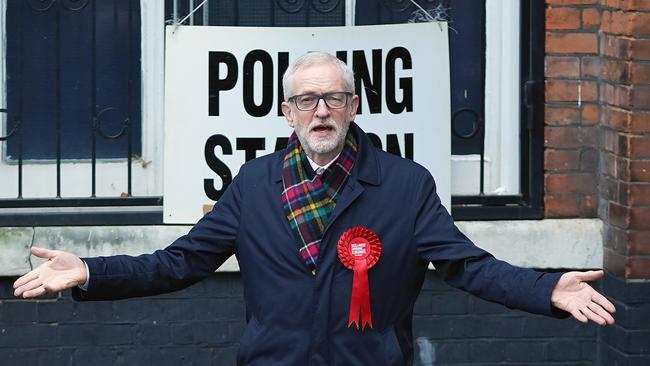
You can be sure the Conservatives won’t have a referendum on that question.
Bleating about how terrible Labour is doesn’t explain why so many ordinary British people are willing to vote for the Corbyn platform despite the stench of anti-Semitism.
The Conservatives have a respectable record of prudent government but few answers to the crisis of capitalism: soaring inequality and stagnant wages.
The scars of the financial crisis a decade ago run deeper in Britain than any other country: bailouts of bankers alongside the relentless immiseration of regional areas, ravaged by the closure of industry and the flight of their youth to London.
Median household incomes in real terms are still lower than a decade ago, while bonuses in the City are booming again.
Even some Conservatives concede privatisation has facilitated gouging.
There’s no question Labour’s agenda would damage the British economy, lifting taxes in an already highly taxed nation.
A 20 per cent consumption tax, a 40 per cent top marginal income tax rate and a 12 per cent national insurance levy mean Westminster and its councils raise taxes equivalent to nearly 40 per cent of GDP, far above the combined tax take of federal and state governments in Australia (about 33 per cent).
John Maynard Keynes once said taxes above 25 per cent of a nation’s income would retard its prosperity.
Labour’s plans for “free” university fees, childcare, broadband and “personal social care” would require tax increases far higher than it concedes. The Tories put the cost at £1.2 trillion ($2.3tn) over five years.
And Labour’s plans would be highly disruptive. The Royal Mail, energy, water and railways would be renationalised. There would be a “living wage” of £10.50 an hour alongside a 32-hour working week, to be phased in by 2030. Incredibly, firms with more than 250 employees would be forced to give 10 per cent of their equity to their staff.
That said, elements of Labour’s plans already exist across the channel in France and Germany, rich countries where government spending is nearer 50 per cent of GDP, and where unions have a greater say in running large companies.
For many it’s not about economics, anyway. Part of Labour’s appeal is also its beliefs. Rather than spouting sound bites, it actually has a program.
The Conservatives will almost certainly win, but they won’t next time without policies to curb the instinctive unfairness that more and more British feel about their economy.




If Labour had a decent leader, it would easily win today’s general election. Jeremy Corbyn is the most unpopular leader since polling began, but his policies are not. Brexit was the choice of about 52 per cent of British voters, while renationalisation of industry — the backbone of Labour’s agenda — commands above 65 per cent support.